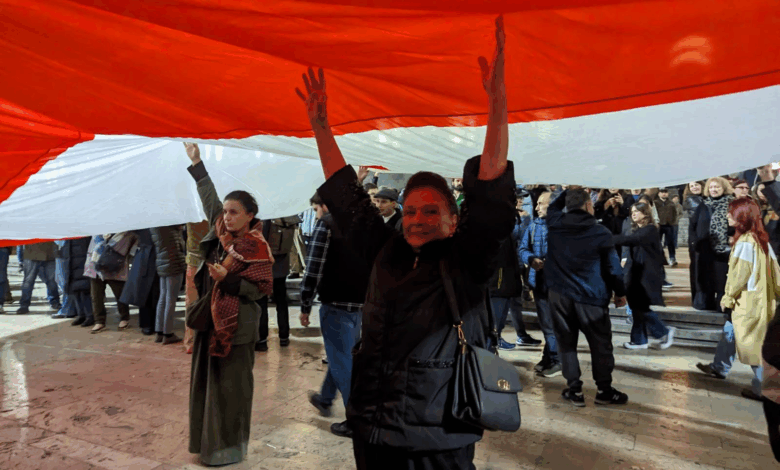
OSCE/ODIHR Calls for Repeal of Georgia’s New Protest Laws
OSCE’s Office for Democratic Institutions and Human Rights (ODIHR) has called for the repeal of Georgia’s new stricter protest laws in its November 12 urgent opinion, warning that the amendments, fast-tracked in October, “raise serious concerns about Georgia’s lack of compliance with international human rights obligations.”
In the 43-page assessment, requested by Georgia’s Public Defender, the watchdog notes that the new rules that introduce administrative detention and eventual criminal sentences for several protest-related violations “directly contradict international standards that require sanctions to be necessary, proportionate, and non-discriminatory.”
By removing less severe alternatives for non-violent actions, the amendments “undermine the principle of proportionality,” the opinion says, adding that such practice is “punitive to an excessive degree.”
“This, compounded by the absence of effective remedies to challenge such detentions, exacerbates the potential for abuse and the risk of arbitrary deprivation of liberty violating Article 9 of the ICCPR and Article 5 of the ECHR,” the opinion states.
The document stresses that detention for assembly-related offenses “should be used only if there is a pressing need to prevent the commission of serious criminal offences and where an arrest is absolutely necessary (e.g., due to violent behaviour).”
OSCE/ODIHR also criticizes the amendment that introduces a 5,000 GEL (USD 1,800) fine for pregnant women, women with children under 12, minors, or persons with severe or significant disabilities who commit administrative offenses, calling the measure “clearly disproportionate” and urging that it “should be reconsidered entirely.”
According to the opinion, the amendments – including penalties for wearing a mask, peacefully participating in assemblies deemed “unlawful” or obstructing roadways – effectively make imprisonment the default sanction, “de facto resulting into disproportionate criminal penalties for the mere exercise of the right to freedom of peaceful assembly, including when guaranteed by the norms of international law.”
“Thus, imposition of criminal penalties in response to a conduct, which may be legitimate and lawful under the international law, would result in arbitrary deprivation of liberty in violation of Article 9 of the ICCPR and Article 5 of the ECHR,” it adds.
The document further argues that disproportionate penalties over protest-related offenses, “may deter the organization and participation in such events and chill the exercise of the rights to freedom of peaceful assembly and freedom of expression.”
The opinion flags the introduction of criminal penalties of up to one year in prison for children (under 18 years of age) for repeated violations of the amended administrative provisions, saying this “contravenes international obligations, which require that deprivation of liberty be used for children only as a measure of last resort, and call upon States to adopt non-custodial alternatives to detention as the default response to criminal offences allegedly committed by minors.”
The document also addresses the amendment criminalizing verbal insults against law enforcement and other officials, now punishable by up to two years’ imprisonment for repeated offenses, warning that “such vague and broad terminology,” which may lead to subjective interpretation, fails to meet the “standards of legality, clarity, and foreseeability.”
“It risks erroneous, overbroad, arbitrary and/or targeted enforcement against legitimate criticism of public officials, thereby undermining freedom of expression and further amplifying the chilling effect on civic activism,” the document argues.
Referencing its March 2025 Urgent Opinion, the organization reiterates that the “vague and broad wording” of certain assembly-related offenses makes them vulnerable to misuse against individuals expressing dissenting views, including human rights defenders, activists, and journalists. It argues that the cumulative effect of the expanded legal framework raises serious concerns that the October 2025 amendments “may be used for purposes beyond those permitted under the ECHR, in violation of Article 18 of the ECHR, in particular.”
“Overall, the October 2025 Amendments raise serious concerns about Georgia’s lack of compliance with international human rights obligations, especially Articles 9, 19 and 21 of the ICCPR and Article 5, 10, 11 and 18 of the ECHR and should be repealed,” the opinion concludes.
More than a hundred protesters have been detained since the disputed parliament fast-tracked stricter protest laws in mid-October. One protester, Zurab Menteshashvili, was placed in pre-trial detention under criminal charges as police allege he repeatedly “blocked the road” during the rally.
Until recently, Rustaveli Avenue has been blocked nightly since November 28, 2024, when the Georgian Dream government announced halting Georgia’s EU accession efforts. For nearly a week, police have physically prevented demonstrators from occupying the road, prompting them to shift to alternative forms of protest, including loud marches through downtown Tbilisi.
Also Read:
This post is also available in: ქართული